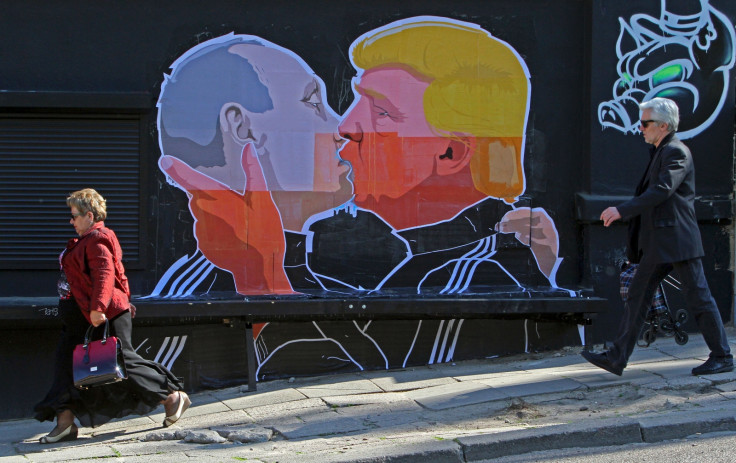If Trump cosies up to Putin, Assad's criminal regime will go unpunished
Russia would be emboldened by an alliance that serves its interests in the Middle East and Eastern Europe.

Outgoing CIA director John Brennan has called on US President-elect Donald Trump to show "prudence and discipline" with regard to the civil war in Syria and rapprochement with Russia.
"The wanton slaughter of civilians that both the Syrians and the Russians are responsible for is nothing short of outrageous," Brennan said in an interview with the BBC. "I do not have confidence that the Russians are going to relent until they are able to achieve as much tactical battlefield successes as possible," he said.
His comments come at a time when the incoming Trump administration has suggested that it will seek closer collaboration with Russia on a number of issues, including the war in Syria and fight against Islamic extremism. "He [Putin] said nice things about me. If we got along well, that would be good," Trump said during the final presidential debate.
Brennan, however, has called into question Russia's motives. "I think President Trump and the new administration need to be wary of Russian promises. Russian promises in my mind have not given us what it is that they have pledged," he said.
A year ago, Russia began its military campaign in Syria on the pretext that it intends to help destroy the Islamic State, a narrative Trump promotes: "I don't like Assad at all, but Assad is killing ISIS. Russia is killing ISIS. And Iran is killing ISIS," he said.
But evidence gathered by NATO indicates that less than 20% of air strikes carried out by Russia in Syria are delivered on the terrorist organisation. Together with the Syrian army and Iranian militia, the Kremlin has primarily targeted Sunni opposition forces to ensure Moscow's central objective is being achieved: The survival of the Assad regime.
Contrary to what the Kremlin would have us to believe, Russia has not made a distinction between moderate and extremist opposition forces. In fact, some of the rebel groups Russia has targeted are supported by the US government and have received training from the CIA, meaning that, for the first time since the 1980s, the Russian military engages in direct combat with forces aligned with Washington. "What Russia's doing is directly enabling ISIL," Brett McGurk, the State Department's special presidential envoy for the Global Coalition to Counter ISIL, warned in a congressional hearing.
Russia recently launched its largest surface deployment since the end of the Cold War with Moscow dispatching its Northern Fleet, including the country's only aircraft carrier, and much of its Baltic Fleet. The large scale military deployment is designed to pave the way for a final assault on the besieged eastern parts of Aleppo, the Syrian opposition's last major urban stronghold which could, for once and for all, turn the tight in favour of the Syrian regime.
And Russia is wasting no time. Just hours after Vladimir Putin congratulated Donald Trump on his election victory, Moscow initiated a large-scale aerial and missile assault on Aleppo. The men had earlier agreed on the phone to unite "efforts in the fight with the common enemy number one –international terrorism and extremism."
The majority of jihadist organisations that operate in Syria today formed, not despite of, but because of the industrial-scale killing by the Syrian regime and directly ties the defeat of terrorist organisations to the downfall of Assad
The two sides seems to have reached the détente although Russia routinely targets schools, kindergartens, hospitals and other civilian infrastructure in areas controlled by rebel forces, and allegedly bombed a UN aid convoy in September. Moreover, it fails to take into account the fact that the majority of jihadist organisations that operate in Syria today formed, not despite of, but because of the industrial-scale killing by the Syrian regime and directly ties the defeat of terrorist organisations to the downfall of Assad.
Consequently, the current US administration has pursued a policy of supporting Arab and Kurdish forces on the ground to resolve the situation in Syria, a strategy that Brennan wishes to see continued. But Trump has suggested that removing the Assad regime, the party responsible for the deliberate and systematic slaughter of hundreds of thousands of people and the displacement of millions, could no longer be Washington's primary objective. "What we should do is focus on ISIS. We should not be focusing on Syria," Trump asserted in an interview with Reuters during the presidential campaign.
The consequences could be devastating. Russia would be emboldened by a new alliance with Washington that serves its interests not just in the Middle East but also in Eastern Europe, while sending a dangerous message to other dictatorial regimes.
Julie Lenarz is the Executive Director of the Human Security Centre. She tweets @MsJulieLenarz
© Copyright IBTimes 2025. All rights reserved.





















